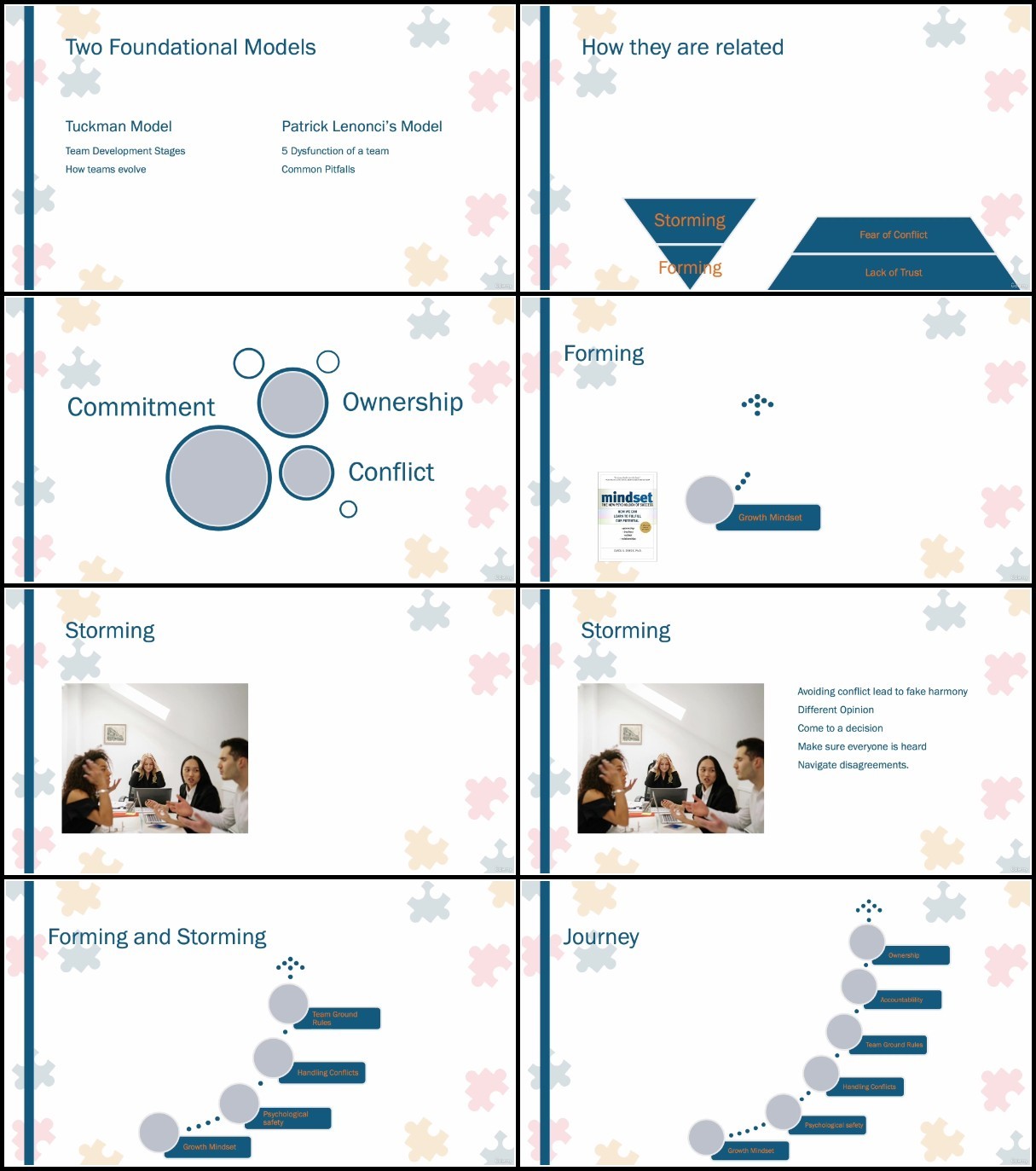Most Commented
High Performing Team Culture




Description material

High Performing Team Culture
Published 11/2024
MP4 | Video: h264, 1920x1080 | Audio: AAC, 44.1 KHz
Language: English | Size: 715.08 MB | Duration: 1h 23m
Guide to building your winning team culture
What you'll learn
Navigate Team Development Stages Successfully
Overcome 5 Dysfunctions of a team
Establish psychological safety
Foster growth mindset within the team
Foster Responsibility and Ownership
Sustain a high-performing team culture
Create a Culture of Accountability and Commitment
Requirements
It is better to be working in a team , you will learn how to communicate better
No leadership experience needed , however it will be very effective for leaders to build their teams
You need to have an open mindset to accept culture and mindset changes
Description
Every team embarks on a unique journey, moving from hopeful beginnings to inevitable challenges, and, with the right guidance, toward high performance. In this course, you'll follow that journey through the natural phases of team development, supported by insights from some of the most respected books and models in team dynamics.Imagine yourself as part of a team discovering its potential. As you progress through each phase, you'll learn to recognize and address the signs of growth and conflict, understand the psychology behind team interactions, and use practical exercises to cement these skills in real time.To build a high-performing team, you need to understand the journey it takes. Whether starting a new team or reshaping an existing one, this course leads you through a structured path using proven models and insights. We begin with Tuckman's Stages of Team Development, learning how teams evolve from Forming to Performing, each stage with its own challenges and growth opportunities. Alongside, Lencioni's Five Dysfunctions of a Team reveal the pitfalls that can undermine team success, such as lack of trust and fear of conflict.Each step of the journey incorporates essential concepts like Carol Dweck's Growth Mindset to foster resilience, Charles Duhigg's Psychological Safety for open communication, and Christopher Avery's Responsibility Model to build true ownership. We also draw on Daniel Goleman's Emotional Intelligence to navigate diverse personalities and Lean Principles for continuous improvement.As your team progresses, you'll see how trust, conflict, commitment, accountability, and results interplay, guiding your team through challenges, celebrating progress, and building a culture where every member thrives. This course isn't just about theory—it's a hands-on journey with tools and exercises that you can apply immediately to cultivate a resilient, high-performing team.Course OutcomesBy the end of this course, you will:1. Navigate each team stage effectively, from building trust to fostering high performance.2. Establish psychological safety and growth mindset as foundations for resilience.3. Create a culture of accountability and ownership where every member contributes.4. Handle real-world challenges through adaptable, practical techniques.5. Sustain a high-performing team culture that evolves and thrives over time.Trainer's BioMona Shokrof is an experienced Enterprise Consultant and Coach, specializing in building high-performing team . She has successfully guided organizations like STC, NBE, Unilever, and startups such as DailyMealz and Vezeeta in embracing more successs. Mona's expertise in fostering psychological safety, facilitating self-organizing teams, and implementing Lean principles aligns perfectly with the course content on creating high-performing teams.
Overview
Section 1: Introduction
Lecture 1 Why this course
Lecture 2 What is a team ?
Lecture 3 Team Stages and the 5 Dysfunctions of a team
Section 2: Tuckman Model - Team Development Stages
Lecture 4 Forming Stage
Lecture 5 Storming Stage
Lecture 6 Norming Stage
Lecture 7 Performing Stage
Section 3: Growth Mindset By Carol Dweck
Lecture 8 Fixed vs Growth Mindset
Lecture 9 Situations - Performance Review
Section 4: Psychological Safety
Lecture 10 Psychological Safety
Section 5: Conflict Management
Lecture 11 Conflicts at work
Lecture 12 Escalating Conflict Example
Section 6: Commitment
Lecture 13 Commitment Defined
Lecture 14 Creating a Commitment Culture
Section 7: Responsibility Process by Christopher Avery
Lecture 15 Responsibility Process
Section 8: Accountability
Lecture 16 Accountability Defined
Lecture 17 Accountability in Practice
Section 9: References and Useful Resources
Lecture 18 Books Referenced in this course
Lecture 19 Emotional Intellegence Assessment
Lecture 20 Personality Type Assessment
Team Leaders,Managers,First time Managers,Project Managers,Scrum Masters,Team Coaches,Team Players,Anyone who want to learn how to deal with a team

Rapidgator links are free direct download only for my subscriber, other hosts are free download for free users
Join to our telegram Group
Information
Users of Guests are not allowed to comment this publication.
Users of Guests are not allowed to comment this publication.
Choose Site Language
Recommended news
Commented



![eM Client Pro 9.2.1735 Multilingual [Updated]](https://pikky.net/medium/wXgc.png)






![Movavi Video Editor 24.0.2.0 Multilingual [ Updated]](https://pikky.net/medium/qhrc.png)

